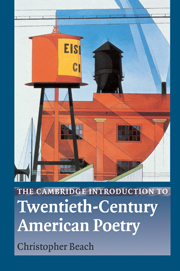Book contents
- Frontmatter
- Contents
- Introduction
- 1 A new century: from the genteel poets to Robinson and Frost
- 2 Modernist expatriates: Ezra Pound and T. S. Eliot
- 3 Lyric modernism: Wallace Stevens and Hart Crane
- 4 Gendered modernism
- 5 William Carlos Williams and the modernist American scene
- 6 From the Harlem Renaissance to the Black Arts movement
- 7 The New Criticism and poetic formalism
- 8 The confessional moment
- 9 Lyric as meditation
- 10 The New American Poetry and the postmodern avant-garde
- Notes
- Glossary
- Index
1 - A new century: from the genteel poets to Robinson and Frost
Published online by Cambridge University Press: 05 June 2012
- Frontmatter
- Contents
- Introduction
- 1 A new century: from the genteel poets to Robinson and Frost
- 2 Modernist expatriates: Ezra Pound and T. S. Eliot
- 3 Lyric modernism: Wallace Stevens and Hart Crane
- 4 Gendered modernism
- 5 William Carlos Williams and the modernist American scene
- 6 From the Harlem Renaissance to the Black Arts movement
- 7 The New Criticism and poetic formalism
- 8 The confessional moment
- 9 Lyric as meditation
- 10 The New American Poetry and the postmodern avant-garde
- Notes
- Glossary
- Index
Summary
With the deaths of both Walt Whitman and John Greenleaf Whittier in 1892, an era in American poetry came to a close. Practically the entire generation which had defined American poetry in the latter half of the nineteenth century was now gone, such grey eminences as Ralph Waldo Emerson, Henry Wadsworth Longfellow, and James Russell Lowell having passed away in the preceeding decade. Yet if the major American poets of the nineteenth century had departed, the first important generation of twentieth-century poets was still far from its maturity. Edwin Arlington Robinson was an undergraduate student at Harvard, four years away from publishing his first book of verse; Robert Frost was two years away from his first published poem and over two decades from his first volume; and Wallace Stevens was a thirteen-year-old schoolboy, three decades from the publication of his first book.
The years from 1880 to 1910 were something of a dark age for American poetry. During a time when the novels of Mark Twain, Henry James, William Dean Howells, Theodore Dreiser, Stephen Crane, and Edith Wharton established the undeniable importance of American fiction, poetry was pushed to the margins of the literary world. Not able to compete with novelists in terms of popularity, and not willing to risk moving beyond the familiar models of nineteenth-century verse, poets settled for an uncontroversial mediocrity of idea, form, and rhetoric.
- Type
- Chapter
- Information
- Publisher: Cambridge University PressPrint publication year: 2003



